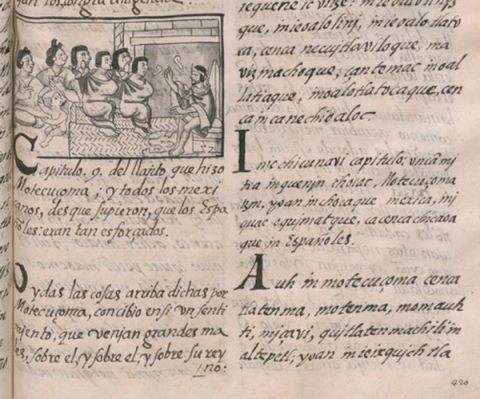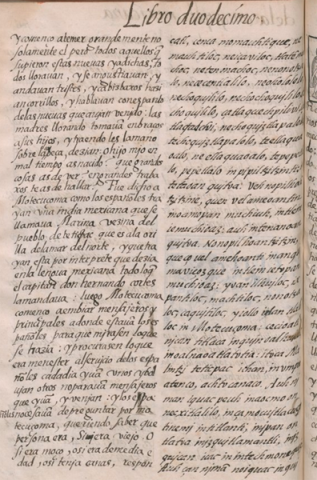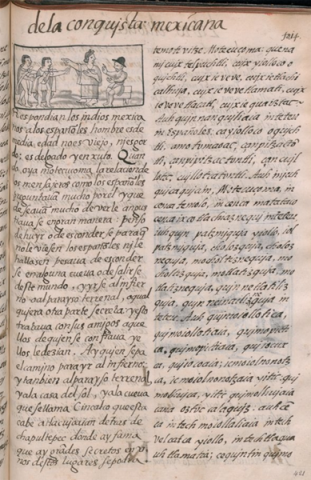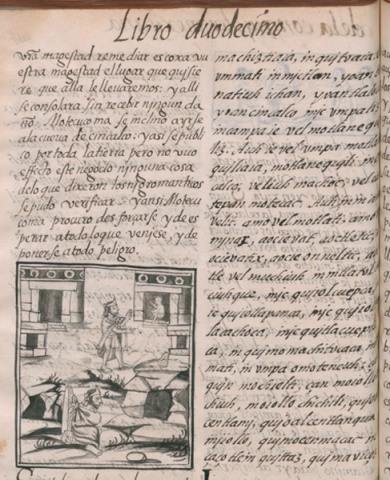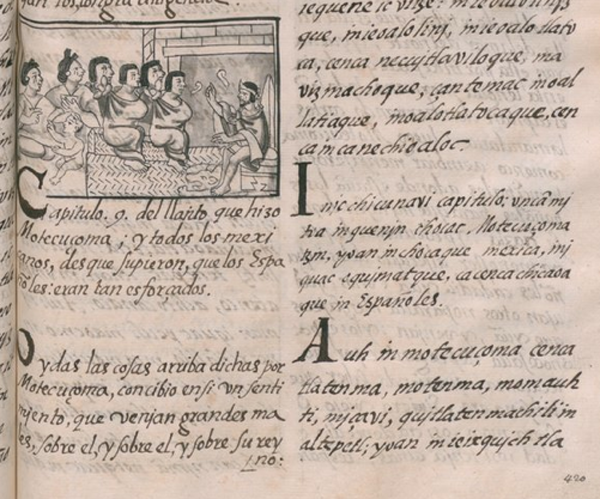 |
[Transcription of the Nahuatl (right-hand column) by James Lockhart:]
[f. 13r., cont.] Inic chicunavi capitulo: vncā mitoa in quenin chocac Motecuçomatzin, yoan in chocaque mexica, in iquac o-quimatque, ca cenca chicaoaque in Españoles.
Auh in motecuçoma cenca tlatenma, motenma, momauhti, miçavi, quitlatenmachili in altepetl; yoan in ie ixquich tla
|
[Translation of the Nahuatl (right-hand column) by James Lockhart:]
Ninth chapter, where it is said how Moteucçoma wept, and the Mexica wept, when they found out that the Spaniards were very strong.
And Moteucçoma lamented his troubles at length; he was afraid and shocked. He told the troubles of the altepetl. And everyone
[Translation of the Spanish (left-hand column) by James Lockhart:]
Chapter Nine, of the lament that Moteucçoma and all the Mexica made when they learned that the Spaniards were so strong.
When Moteucçoma had heard the things mentioned above, he conceived a sentiment that great evils were coming upon him and his realm.
|
[Translation of the Nahuatl into Spanish by Fr. Bernardino de Sahagún; transcription of the Spanish (left-hand column) by James Lockhart:]
[f. 13r., cont.] Capitulo .9. que hizo Motecuçoma; y todos los mexicanos, desque supieron, que los Españoles: eran tan esforçados.
Oydas las cosas arriba dichas por Motecuçoma, concibio en si vn sentimiento, que venian grandes males, sobre el,* y sobre su reyno:
----------
*SOBRE EL. Through inadvertence "y sobre el" was written between this and "y sobre su reyno."
|
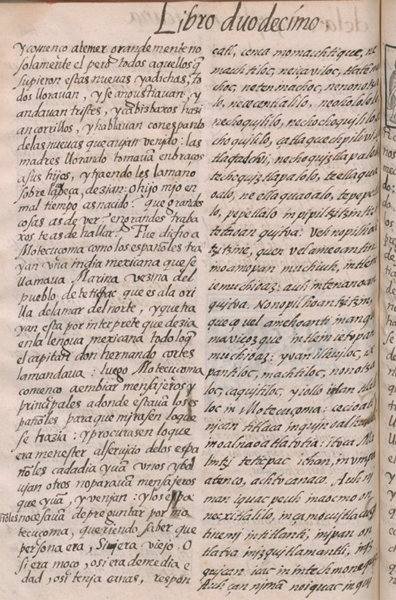 |
[Transcription of the Nahuatl (right-hand column) by James Lockhart:]
[f. 13v.] catl, cenca momauhtique, nemauhtilocneiçaviloc, tlatēmachoc, netenmachoc, nenonotzalo, nececentlalilo, neoholololo, nechoquililo, nechochoquililo, techoquililo, ça tlaquechpilivi, ça tlaquechvi, nechoquiztlapalolo, techoquiztlapalolo, teellaquaoalo, neellaquaoalo, tepepetlalo, pepetlalo in pipiltzitzinti; in tetaoan quitoa: Veh nopilhoātzitzine, quen vel ameoantin in oamopan muchiuh, in tlein ie muchioaz: auh in tenanoanquitoa. No nopilhoantzitzin, queço uel amehoanti in anquimaviçozque in tlein ie topan muchioaz:
yvan ilhuiloc, ixpantiloc, machtiloc, nonotzaloc, caquitiloc, yiollo itlan tlaliloc in Motecuçoma: ce cioatl nican titlaca in quinoalhuicac, in oalnaoatlatotia: itoca Malintzi teticpac ichan, in vmpa atenco, achto canaco.
Auh niman iquac peuh in aocmo onnecxitlalilo, in ça mocuitlacueptinemi in titlanti, in ipan ontlatoa in izquitlamantli, in izquican icac in intech monequiz.
Auh çan nimā no iquac in qui
|
[Translation of the Nahuatl (right-hand column) by James Lockhart:]
was very afraid. Fear reigned, and shock, laments, and expressions of distress. People talked, assembled, gathered, wept for themselves and for others. Heads hung, there were tearful greetings,words of encouragement, and stroking of hair. Little children’s heads were stroked. Fathers would say, “Alas, my children, how is it with you, that what is about to happen has happened to you?” And mothers said, “Oh my children, how is it with you who are to behold what is about to happen to us?”
And it was told, presented, made known, announced, and reported to Moteucçoma, and brought to his attention, that a woman, one of us people here, came accompanying them as interpreter. Her name was Marina and her homeland was Tepeticpac, on the coast, where they first took her.
And then at this time they began no longer to place themselves at [the Spaniards’] feet; the messengers who had seen to everything they needed now just went turning their backs.
At this same time [the Spaniards] came asking about
[Translation of the Spanish (left-hand column) by James Lockhart:]
He began to experience great fear, and not he alone but all those who heard the news just mentioned. All wept and were anxious, going about melancholy and with head down. They formed small groups and spoke with shock of the news that had come. The mothers, weeping, took their children in their arms, and patting their heads said, "O my child, you have been born in a bad time! What great things you are to see! You are to be in great travails!"
Moteucçoma was told how the Spaniards were bringing along with them a Mexica [Nahuatl-speaking] Indian woman called Marina, a citizen of the settlement of Teticpac, on the shore of the North Sea [Caribbean], who served as interpreter and said in the Mexican language everything that Captain don Hernando Cortés told her to.
Then Moteucçoma began to send messengers and leading figures to where the Spaniards were to see what was going on and provide what was necessary for the service of the Spaniards. Every day some were leaving and others returning; messengers were constantly coming and going.
And the Spaniards were continually asking after Moteucçoma, wanting to know what kind of a person he was, whether he was old or young or of middle age, or gray-haired.
|
[Translation of the Nahuatl into Spanish by Fr. Bernardino de Sahagún; transcription of the Spanish (left-hand column) by James Lockhart:]
[f. 13v.] y començo a temer grandemente no solamente el pero todos aquellos q̄ supieron estas nueuas ya dichas, Todos llorauan, y se anguistiauan, y andauan tristes, y cabizbaxos hazian corrillos, y hablauan con espanto de las nueuas que auian venido: las madres llorando tomauā en braços a sus hijos, y traendoles la mano sobre la cabeça dezian: o hijo mio en mal tiempo as nacido! que grandes cosas as de ver! en grandes trabaxos te as de hallar!
Fue dicho a Motecuçoma como los españoles trayan vna india mexicana que se llamaua Marina vezina del pueblo de teticpac que es la orilla de la mar del norte, y que trayan esta por interprete que dezia en la lengua mexicana todo lo q̄ el capitan don hernando cortes la mandaua:
luego Motecuçoma començo a embiar mensajeros y principales a donde estauā los españoles para que mirasen lo que se hazia: y procurasen lo que era menester al seruicio de los españoles cada dia yuā vnos y boluian otros no parauā mensajeros que yuā, y venian:
y los españoles no cesauā de preguntar por motecuçoma, queriendo saber que persona era, Si era viejo. O si moço, o si era de media edad, o si tenia canas,*
----------
*CANAS. f. 13v. ends with the excess letters "respon."
|
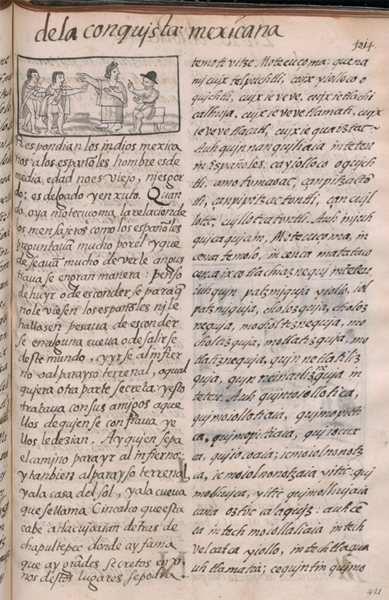 |
[Transcription of the Nahuatl (right-hand column) by James Lockhart:]
[f. 14r.] temotivitze Motecuçoma: quenami cuix telpuchtli, cuix yiolloco oquichtli, cuix ie veve, cuix ie tlachicalhuia, cuix ie veve tlamati, cuix ie veve tlacatl, cuix ie quaiztac? Auh quinnanquiliaia in teteu in Españoles: ca yiolloco oquichtli, amo tomaoac, çan pitzactōtli, çan pipitzactontli, çan cuillotic, cuillotcatontli.
Auh in iuh quicaquia in, Motecuçoma, in cenca temolo, in cenca matataco cenca ixco tlachiaznequi inteteu iuhquin patzmiquia yiollo, iolpatzmiquia, cholozquia, choloznequia, mocholtiznequia, mocholtizquia,motlatizquia, motlatiznequia, quinnetlatilizquia, quinneinailiznequia in teteu. Auh quimoiollotica, quimoiollotiaia, quimopictica, quimopictiaia, quiiocuxca, quiiocoaia; ic moiolnonotzca, ic moiolnonotzaia yitic: quimolhuica, yitic quimolhuiaia cana oztoc calaquiz, auh cēca intech moiollaliaia intech vel catca yiollo, intech tlaquauh tlamatia; cequintin quimo |
[Translation of the Nahuatl (right-hand column) by James Lockhart:]
Moteucçoma: “What is he like? Is he a youth, a mature man, already old, advanced in age, or an old man but able? Is he aged, is he white-haired?” And they replied to the gods, the Spaniards, “He is a mature man, not corpulent, but slim and slender, on the thin side.”
When Moteucçoma heard this, that many and persistent inquiries were being made about him, that the gods wanted to see his face, he was greatly anguished. He repeatedly wished to flee, to hide, to take refuge from the gods. He thought of, imagined, invented, weighed and turned over in his mind that he would go into a cave somewhere. He made it known to some people with whom he consoled himself, with whom he was comfortable, with whom
[Translation of the Spanish (left-hand column) by James Lockhart:]
The Mexica Indians replied to the Spaniards, "He is a man of middle age, not old, nor is he fat; he is slender and lean."
When Moteucçoma heard the messengers' account of how the Spaniards were asking so much about him and that they greatly desired to see him, he was seized with great anxiety. He thought of fleeing or going into hiding so that the Spaniards would not see or find him. He thought of hiding in some cave, or leaving this world and going to the inferno or to terrestrial paradise or some other secret place, and he spoke of this with his friends in whom he trusted. They told him, "There are people who know the way to go to the inferno, and also to the terrestrial paradise and the house of the sun, and to the cave that they call Cincalco, which is close to Atlacuihuayan [Tacubaya], behind Chapultepec, where it is said that there are great secrets.
|
[Translation of the Nahuatl into Spanish by Fr. Bernardino de Sahagún; transcription of the Spanish (left-hand column) by James Lockhart:]
[f. 14r.] Respondian los indios mexicanos a los españoles hombre es de media edad no es viejo, ni es gordo: es delgado y enxuto.
Quando oya motecuçoma la relacion de los mensajeros como los españoles preguntauā mucho por el que deseauā mucho de verle angustiauase en gran manera: penso de huyr o de esconderse para q̄ no le viesen los españoles ni le hallasen pesaua de esconderse en alguna cueua o de salirse deste mundo, y yrse al infierno o al parayso terrenal, o qualquiera otra parte secreta: y esto trataua con sus amigos aquellos de quien se confiaua y ellos le dezian. Ay quien sepa el camino para yr al infierno: y tanbien al paraíso terrenal y a la casa del sol, y a la cueua que se llama Cincalco que esta cabe atlacuioaian detras de chapultepec donde ay fama que ay grādes secretos en vnos destos lugares se podrá.
|
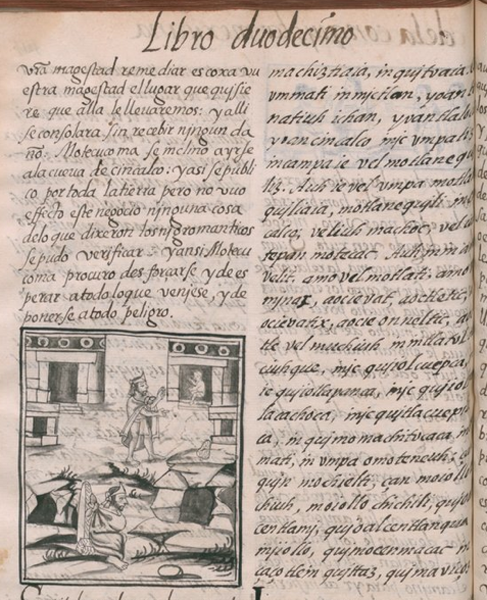 |
[Transcription of the Nahuatl (right-hand column) by James Lockhart:]
[f. 14v.] machiztiaia, inquitoaia. Ca vmmati in mictlan, yoan tonatiuh ichan,yoan tlalocā yoan cincalco* inic vmpatiz in campa ie vel motlanequiliz.
Auh ie vel vmpa motlanequiliaia, motlanequili in cincalco: vel iuh machoc, vel iuh tepan motecac. Auh inin amo velit, amo vel motlati, amo vel minax, aoc ievat, aoctletic, aoc ievatix, aoc ie onneltic, aoctle vel muchiuh in intlatol tlaciuhque, inic quiiolcuepca, inicquiiollapanca, inic quiiolmalacachoca, inic quitlacuepilica, in quimomachitocaca in ommati, in vmpa omoteneuh; çan quinmochielti, çan moiollotechiuh, moiollochichili, quioalcentlami, quioalcentlanqua in iiollo, quimocenmacac in çaço tlein quittaz, quimaviçoz.
----------
*CINCALCO. Possibly Mictlan is literally the land of the dead, Tonatiuh ichan the home of the sun, and Tlalocan the verdant seat of the rain and earth god, much as in the Spanish version, but it is also possible that all four places named were caves with reputations as places of access to supernatural realms.
|
[Translation of the Nahuatl (right-hand column) by James Lockhart:]
he frequently conversed, and they said, “The way is known to Mictlan, Tonatiuh ichan, Tlalocan, and Cincalco for remedy, whichever suits you.”
The one he preferred was Cincalco. It became well known, word spread among the public. But he was notable to do it, not able to hide and take refuge. He took no steps; it came to nothing. What the rainmakers had said when they influenced and instigated him, confusing him and turning things around on him, when they claimed they knew the way to the above-mentioned places, was not carried out, could not occur. [Moteucçoma] just awaited [the Spaniards]; he strengthened his resolve, mastered his emotions, and resigned himself entirely to whatever he was to see and behold.
[Translation of the Spanish (left-hand column) by James Lockhart:]
Your majesty could find remedy in one of these spots. Let your majesty choose the one you want and we will take you there, and there you can console yourself without receiving any harm.
Moteucçoma was inclined to go to the cave of Cincalco, and so it was published throughout the whole land, but this business did not come to pass. Nothing of what the necromancers said could be verified. And so Moteucçoma tried to take courage, awaiting whatever should come and exposing himself to all the dangers.
|
[Translation of the Nahuatl into Spanish by Fr. Bernardino de Sahagún; transcription of the Spanish (left-hand column) by James Lockhart:]
[f. 14v., la parte de arriba] v̄r̄a magestad remediar escoxa vuestra magestad el lugar que quisiere que alla le lleuaremos: y alli se consolara sin recebir ningun daño.
Motecuçoma se inclino a yrse a la cueua de cincalco: y asi se publico por toda la tierra pero no vuo effecto este negocio ninguna cosa de lo que dixeron los nigromanticos se pudo verificar. y ansi Motecuçoma procuro desforçarse y de esperar a todo lo que veniese, y de ponerse a todo peligro.
|
